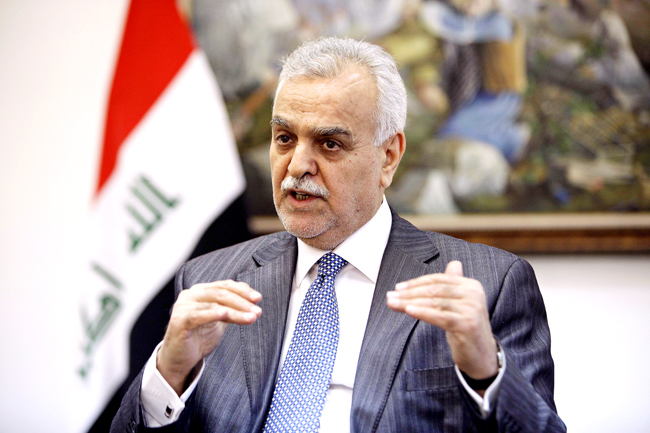BAGHDAD — Iraq’s Shiite-dominated Cabinet suspended boycotting Sunni-backed ministers Tuesday, an official said, deepening a sectarian conflict of politics and violence that has raised fears of civil war in Iraq now that U.S. troops are gone.
The Sunni-based Iraqiya bloc started its boycott last month to protest an arrest warrant against the Sunni vice president on terrorism charges. The official, Tareq al-Hashemi, denied the allegations and fled to the autonomous Kurdish area of Iraq, out of reach of authorities in Baghdad — a move that itself underlines the sectarian divisions in Iraq and the challenge of keeping the country together after the exit of U.S. forces a month ago.
Government spokesman Ali al-Dabbagh said the Cabinet decided that the ministers who have failed to attend sessions are no longer “allowed to manage ministries, and all decisions that will be signed by them are invalid.” The Iraqi ministers would be allowed back into the Cabinet if they end their boycott, al-Dabbagh said.
Iraqiya spokeswoman Maysoun Damluji charged that the suspension is part of the Shiite Prime Minister Nouri al-Maliki’s efforts to sideline the Sunni-backed alliance and cement his own grip on power. Only one of nine Iraqiya ministers broke with the bloc’s boycott and attended Tuesday’s Cabinet session, Damluji said.
“It’s an escalation by al-Maliki to push Iraqiya away,” Damluji said.
The government crisis could intensify sectarian resentments that have remained raw in Iraq, despite years of efforts to overcome them. Minority Sunnis fear the Shiite majority is squeezing them out of any political input, and Shiites suspect Sunnis of links to insurgency.
Alongside the government crisis, violence has surged across Iraq since American troops left Dec. 18, raising fears of re-igniting the fighting between Sunni and Shiite militias that raged a few years ago and brought the country to the brink of civil war.
Since the beginning of the year, a string of bombings has left at least 155 people dead. Most of the attacks appeared aimed at Iraq’s Shiite majority, suggesting Sunni insurgents are seeking to undermine the Shiite-dominated government and its efforts to protect people from violence without American backup.
On Tuesday, insurgents killed five police officers at a checkpoint in the town of Rutba in the western Anbar province, police and hospital officials said. The police were guarding the highway that links Iraq with neighboring Jordan.
On Saturday, more than 50 Shiite pilgrims were killed in a bombing in southern Iraq, the deadliest attack against the country’s Shiite majority in a year.
The government disarray appears to be affecting foreign contractors still in Iraq after the American withdrawal, including thousands who work for the U.S. Embassy in Baghdad and its development projects around the country.















